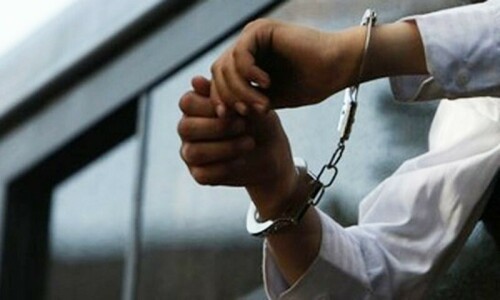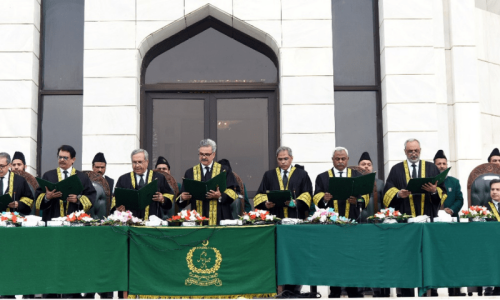Absent media ethics

IN July 2010, I was working for a private news channel in the country when Airblue flight 202 crashed in Margalla Hills in Islamabad, killing all 152 souls on board. In the opening hour of the coverage, I noticed a graphic that started running on the channel’s screen, of a plane taking off from the bottom left, and crashing into a billowing ball of fire on the bottom right. This occurred in a loop, roughly every 10 seconds. When flagged, the director news (to his credit) immediately took it off air and chastised the newsroom shift-in-charge.
This small example illustrates Pakistani broadcast media’s inability to rationalise ethics in journalism, mowing down every conceivable standard in their relentless pursuit of being the ‘first’, ‘biggest’, or ‘best’.
Ten years later, the situation is not very different. PIA flight 8303 crashed in Karachi, and the broadcast coverage by local television channels was deplorable, horrifying, and utterly disgraceful.
Journalists could be seen screaming into microphones that they had recorded footage of all injured and dead, so that ‘we can bring it to you first’. Casualties were displayed across television screens for a period of time, with nary a thought for the families of the injured or deceased. The passenger manifest was publicly shared without following internationally and widely established conventions with regard to privacy, consent or the obvious priority to first inform the family.
Broadcast media’s coverage of the PIA crash was deplorable.
Another channel played the last few moments of the mayday recording on loop. News anchors, hosts, and media personalities began theorising as to what may have caused the crashed as early as 3:30pm, less than an hour after the plane went down. All of this was exacerbated by screaming reporters claiming that they had first arrived on the scene, ‘even before rescue personnel got there’.
The list goes on and on. In every sense, broadcast media showed the utmost level of unethical, despicable, and frankly disgusting behaviour.
Electronic broadcast media in Pakistan spares no effort to highlight instances where its freedoms are infringed upon (justified in its own right), but never seems to look inward and determine if it is at fault for, well, anything. While freedom of the media needs to be protected and treated as sacrosanct, why is it that this sanctity does not extend to their own coverage? Why is it that it is considered unethical to ban a news channel, paper or journalist, but such reporting is considered ‘efficient journalism’?
There exists an umbrella organisation to monitor and enforce a code of ethics for electronic broadcast media, called the Pakistan Electronic Media Regulatory Authority. Many call Pemra a toothless organisation for failing to rein in channels that continue to display unethical behaviour. Pemra itself would have you believe that it is constantly on the prowl, serving notices, imposing fines and keeping everyone in line.
The truth lies somewhere in the middle. For too long, Pemra’s appointment has been a political one, with the body accused of taking action against those it is ‘cleared’ to take action against. Private conversations with staff at Pemra indicate that the vast majority of the fines and reprimands they impose are challenged in court, where they are stuck in an infinite loop of hearings, delays and countersuits.
As is the case with most things in Pakistan, the issue is not that there exists no code of ethics; it is that it is not implemented effectively. Efforts have been made many times to create a streamlined version of the said code, and implement it universally across all electronic media, but the effort does not seem to take root. Pemra too has guidelines on the matter, though they are not as wisely circulated or easy to find as they ought to be, and the language used is often nebulous, prone to very specific interpretations, and confusing. For example, if ‘immoral content’ must not be aired, what precisely is immoral, and who decides the definition?
The first step on the road to ensuring ethical journalism in Pakistan is to establish and agree upon a universal best practices code of ethics, combining the many versions that float about today. They need to be clear, unambiguous in their language (a major problem with the code now), and follow established guidelines for ethical reporting. Finally, in order to implement them universally, any breach needs to be formally criminalised through proper legislation, and judiciously pursued by both the watchdog and the courts.
Until this happens, we will continue to see bloodied bodies from horrific scenes of carnage without a single thought being spared for the departed or the bereaved.
The writer is a senior research fellow at the Centre for Research and Security Studies, Islamabad, and a freelance journalist.
Twitter: @zeesalahuddin
Published in Dawn, May 24th, 2020
















































